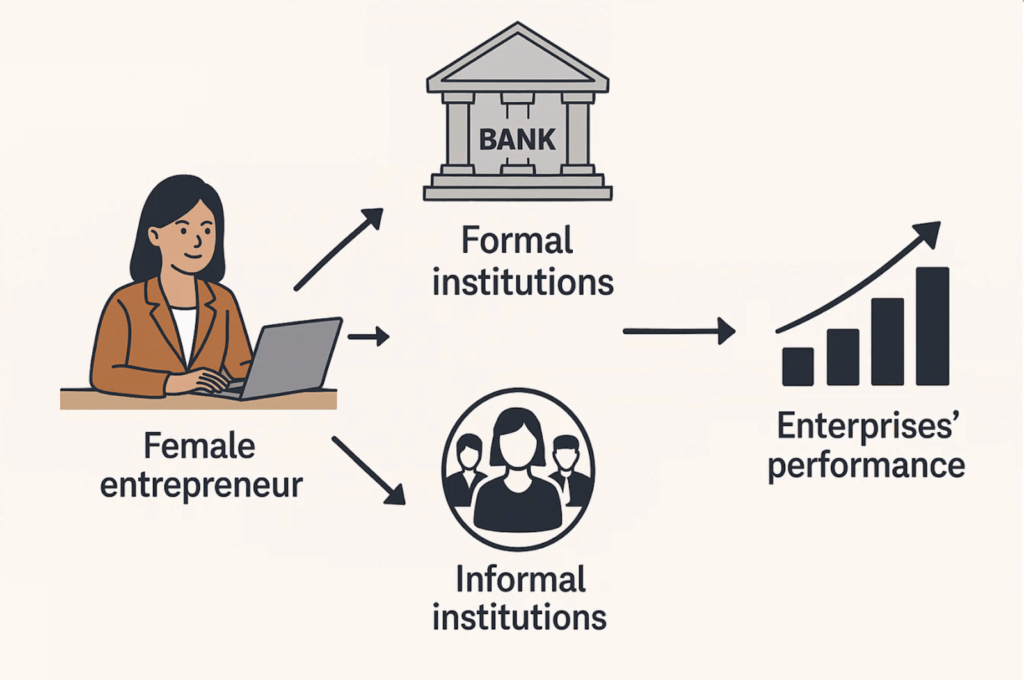(Dis)Empowered by Context: Female Entrepreneurial Success
On May 27, the United Nations University hosted a compelling session titled “(Dis)Empowered by Context: Female Entrepreneurs, Firm Performance and Institutions” as part of its BIG IDEAS Dialogue Series. The event was moderated by Sawako Shirahase, Senior Vice-Rector of the United Nations University and Assistant Secretary-General of the United Nations, and featured Dr Hanna Berkel, a Research Fellow at UNU-WIDER, who presented collaborative research conducted with Dr Neda Trifkovic from the University of Copenhagen.
The study delved into how gender and institutional contexts influence the performance of manufacturing enterprises in Mozambique, Vietnam and Myanmar.

Understanding the Research
Dr Berkel’s research investigates the interactions between private firms and both formal institutions (such as tax offices, business registration services, banks and utility providers) and informal institutions (such as business associations). The central question posed was: Do these institutions empower or hinder female entrepreneurs?

The study utilized rich, survey-based datasets collected through UNU-WIDER’s collaborative projects in each country. By applying econometric analysis, the researchers explored how institutional engagement relates to labor productivity, acknowledging that while the results are not necessarily causal, they highlight significant associations worth further exploration.
“Our results are not necessarily causal, but they highlight strong associations or patterns that are worth investigating and discussing,” Dr Berkel said.
Key Findings
Dr Berkel highlighted that across all three countries studied, firms that engage with institutions—particularly formal institutions—tend to be more productive. “Each additional institutional interaction is associated with a 24% increase in labor productivity,” she said.
When it comes to gender disparities, female-led firms generally underperformed compared to male-led firms; however, this gap narrowed when women engaged with institutions. Notably, female managers often led higher-value firms and were more highly educated, sometimes even outperforming their male peers.
“Female-led firms on average underperform compared to male-led firms, but the gap narrows when women engage with institutions,” Dr Berkel said. “Female owners tend to underperform due to factors like sector and social expectations, while female managers often outperform their male peers.” She added, “There is a persistent productivity gap between male and female-led firms … but this gap is not just about individual capability. A major part of the story lies in institutional barriers that disproportionately affect women.”
Dr Berkel explained that the barriers women face are multifaceted. They include regulatory challenges such as weaker property rights, limited access to finance and greater exposure to corruption. Additionally, normative barriers such as cultural expectations often restrict women’s time, mobility and visibility in business. Cognitive barriers also play a role, where internalized gender norms affect how women enter the sector, shape their ambitions and influence how they define success in their businesses.
Country-Specific Insights
- Mozambique: Female-led firms showed the strongest positive link between institutional engagement and productivity. Each additional engagement was associated with about a 30% increase in productivity. Female managers outperformed male peers, while female owners underperformed.
- Vietnam: With a higher representation of female-led firms (around 40%), the association between institutional engagement and productivity was positive but less pronounced. Female managers performed on par with male managers, while female owners underperformed.
- Myanmar: No significant productivity gap was observed between female-led and male-led firms. However, institutional engagement appeared beneficial only for male-led firms. In some cases, interactions with institutions such as banks were negatively associated with productivity for female-led firms, suggesting potential institutional discrimination.
Policy Implications
The findings underscore the need for gender-sensitive policy design tailored to each country’s context:
- Mozambique and Vietnam: Policies should focus on supporting high-potential female-led firms through targeted capacity building, addressing structural barriers to finance, providing mentorship and facilitating entry into higher-value sectors.
- Myanmar: Institutional reforms are necessary to make institutions more gender-sensitive. This includes auditing financial systems, adjusting collateral requirements and ensuring that women are not penalized for engaging with formal institutions.
Overall, the key takeaway from Dr Berkel’s presentation was crystal clear: the way institutions function has a real impact, and when they don’t support women, economies fall short. Institutions shape opportunities, and when they exclude women, everyone loses.
“Our findings highlight a clear case for gender-sensitive policy design, tailored to each context,” Dr Berkel said. “These institutional constraints don’t just hold women back, but they also limit broader economic and social development. So if we want inclusive and sustainable growth, we need to understand and address these barriers and design policies that empower all entrepreneurs regardless of gender.”
Creating more inclusive systems isn’t only about equity and justice, it’s about realizing the full potential of economic and social growth.
About the Speaker
Since March 2023, Hanna Berkel has been a Research Fellow at UNU-WIDER, based in Mozambique, where she works on the “Inclusive Growth in Mozambique — Scaling-up Research and Capacity” programme. She is a development economist with a multidisciplinary background, specializing in microeconomic empirical methods, enterprise dynamics, informality, disaster preparedness and social protection.
Hanna has published in World Development, the Journal of Development Studies and the International Journal of Disaster Risk Reduction. She has also served as the field coordinator for multiple data collection efforts in Mozambique.
Prior to her role at UNU-WIDER, Hanna completed her PhD at the University of Copenhagen.

